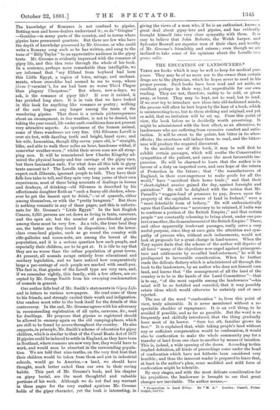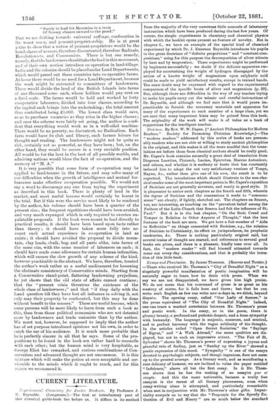THE EDUCATION OF LANDOWNERS.* THERE are books which it may
be well to keep for medical pur- poses. They may be of no more use to the owner than certain drugs are to the physician, which he hopes never to need in his proper person. Such books have been read and set aside, as excellent perhaps in their way, but unprofitable for our own reading. They are not, therefore, rashly to be sold, or given away, or burnt. They may be kept, not to read, but to lend. If we ever try to introduce new ideas into old-fashioned minds, the process will often be best begun by the loan of a book, which is uninteresting to us, but to them striking and original, and yet so mild, that no irritation will be set up. From this point of view, the book before us is decidedly worth preserving. It might be administered with the best effect, as an alterative, to landowners who are suffering from excessive comfort and satis- faction. It will be sweet to the palate, but bitter in its after- effects ; the sweetness will induce them to read, and the bitter- ness will produce the required discontent.
In the medical use of this book, it may be well first to exhibit certain passages, which will soothe the Conservative sympathies of the patient, and cause the most favourable im- pression. He will be charmed to learn that the author is in favour of a duty on imported corn, and sees hope of the return of Protection in the future ; that " the manufacturers of England, in their over-eagerness to make goods for all the world," have " sacrificed their home trade ;" and that their "short-sighted avarice gained the day, against foresight and patriotism." He will be delighted with the notion that Mr. Parnell's " waggon-load of promises to pay, drawn upon the property of the capitalist owners of land in Ireland," were a " most detestable form of bribery." He will enthusiastically agree that Candahar was " necessary to be retained, if India was to continue a portion of the British Empire ;" and that certain people " are constantly scheming to bring about, under one pre- text or another, the dismemberment of the British Empire." These, and other apparently irrelevant passages, really serve a very useful purpose, since they at once gain the attention and sym- pathy of persons who, without such inducements, would not look at proposals for a great change in land-tenure. When the Tory squire finds that the scheme of the author will deprive of all force " many of the objections now urged against primogeni- ture and settlements by so-called land-reformers," he will be predisposed to favourable consideration. When he further reads the delicate flattery which is administered all through the book to the landowners, by an author who does not himself own land, and learns that "the management of all the land of the country is to be in the hands of the Land Committees "—that is to say, " of the most capable among the landowners "—his mind will be so fortified and consoled, that it may possibly retain ideas which would otherwise be certainly and at once rejected.
The use of the word "confiscation " is, from this point of view, truly admirable. It is never mentioned without a re-
spectable shudder of repugnance. It is an evil thing, to be avoided if possible, and as far as possible. But the word is so frequently and skilfully introduced, that the thing gradually loses most of its horror. " Seen too oft, familiar grows its face." It is explained that, while taking people's land without any or sufficient compensation would be confiscation, it would also be confiscation to make the whole community pay for a transfer of land from one class to another by means of taxation. This is, indeed, a wide opening of the doors. According to this implied definition, all kinds of proceedings come under the head of confiscation which have not hitherto been 3onsidered very horrible ; and thus the innocent reader is prepared to learn that, at least in the author's plan, some modified and mild form of confiscation might be tolerable.
By easy stages, and with the most delicate consideration for his prejudices, the landowner is brought to see that great changes are inevitable. The author means,—
• Co-operation in Land Tillage. By "M. A." London . Cassell, Vetter Galpin, and Co.
"Sorely to lead his Memmins in a train Of flowery clauses onward to the proof," that we are drifting towards universal suffrage, confiscation in its worst sense, and peasant-proprietorship. He is at great pains to show that a nation of peasant-proprietors would be the bond-slaves of usurers, therefore discontented, therefore Radicals, Revolutionists, and Communists. There is but one remedy, namely, that the landowners should take the lead in this movement, and of their own motion introduce co-operation in land-tillage. India and the colonies should be placed under Land Departments,
which would parcel out these countries into co-operative farms. At home there would be no need for a Land Department, because the work might be entrusted to committees of landowners. These would divide the land of the British Islands into farms of one thousand acres each, whose holders would pay rent on a fixed scale. The farms would be held and worked by forty co-operative labourers, divided into four classes, according to the capital each brings into the undertaking ; the total amount thus contributed being £5,000. The lowest class would save, so as to purchase vacancies as they arise in the higher classes ; and once the scheme were fairly set going, the author is confi- dent that everything would work as in a well-oiled machine- There would be no poverty, no discontent, no Radicalism. Each farm would have its club and library, each farmer leisure for thought and reading. The landowners might not be quite so rich, certainly not as powerful, as they have been; but, on the other hand, they would be secure in a very enviable position. All would be for the best in the best of all possible worlds, and admiring nations would bless the fact of co-operation, and the memory of " M. A."
It is very possible that some form of co-operation may be applied to land-tenure in the future, and may solve many of our difficulties when the growth of intelligence and mutual for- bearance make effective co-operation possible. We would not say a word to discourage any one from trying the experiment as described in this book. There is plenty of land in the market, and most useful lessons would certainly be learnt in the trial. But if this were the service most likely to be rendered by the author, his volume should have been a quarter of the present size ; the frequent repetitions should have been avoided, and very much expunged which is only required to sweeten un- palatable proposals. If the book were meant to lead directly to practical results, it should have been based upon facts rather than theory ; it should have taken more fully into ac- count such actual experience in co-operation in land as exists ; it should have avoided the proposal to divide moun- tain, clay lands, chalk,-bog, and all parts alike, into farms of the same size, with the same number of labourers on each ; it should have made some allowance for certain human infirmities, which will ensure the slow growth of any scheme of the kind, however practicable in the abstract. We have, therefore, treated the author's work rather as a useful medicament for loosening the obstinate consistency of Conservative minds. Starting from a Conservative stand-point, flattering landowning prejudices, he yet shows that the old state of affairs cannot continue; that the " present crisis threatens the existence of the whole class of landowners ;" and that " if they dally with the Land question till they have lost all influence in solving it, not only may their property be confiscated, but this may be done without benefit to the masses." These are useful lessons, which some persons will be more likely to learn from such a book as this, than from those political economists who are not detested more by landowners and trade unionists than by the author. We must not, however, be supposed to imply that the author has of set purpose introduced opinions not his own, in order to catch the ear of his audience. It is much more probable that he is perfectly sincere in all that he says. Some of the pro- positions to be found in the book are rather hard to reconcile with each other; but the human mind is very hospitable, as George Eliot has remarked, and curious combinations of Con- servatism and advanced thought are not uncommon. It is this mixture which will make the potion at once acceptable and ser- viceable to the minds which it ought to reach, and for this reason we recommend it.



































 Previous page
Previous page